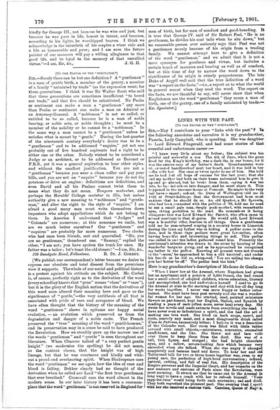[TO THE EDITOR OP THE "SPECTATOR."]
&R.—Surely there can be but one definition ? A " gentleman " is a man of gentle birth, a member of the gentry, a member of a family " untainted by trade " (as the expression went) for three generations. I think it was Sir Walter Scott who said that three generations are sometimes insufficient "to breed out trade," and that five should be substituted. No Psalm or sentiment can make a man a " gentleman " any more than Psalm or sentiment can make a man an Admiral or an Attorney-General. A " nobleman " is not so called, or entitled to be so called, because he is a man of noble bearing, or noble acts, or noble thoughts ; he must be a member of the nobility or he cannot be a "nobleman." In the same way a man cannot be a " gentleman " unless he satisfies what is meant by " gentle." During the last quarter of the nineteenth century everybody's desire was to be a " gentleman " and to be addressed " esquire," yet not one probably out of five hundred aspirants had a right to be either one or the other. Nobody wished to be considered a Judge or an architect, or to be addressed as Baronet or F.R.S., yet it was a general aspiration to bear other styles, and without the smallest justification. You are not a " gentleman" because you wear a clean collar and pay your bills, and you are not an " esquire" because you do not dig potatoes or drive an engine : definitions are definitions, and even David and all his Psalms cannot twist them to mean what they do not mean. Tempera mutantur, and perhaps the Heralds' College ntutatur in illis, but unless authority give a new meaning to " nobleman " and " gentle- man," and alter the right to the style of " esquire," I am afraid a good many men must write themselves down impostors who adopt appellations which do not belong to them. In America I understand that " Judges " and " Colonels " are numerous ; at this nonsense we smile, but are we much better ourselves P Our " gentlemen " and "esquires" are probably far more numerous. Two clerks. who had once been friends, met and quarrelled. " Sir, you are no gentleman," thundered one. " Sammy," replied the other, " I am not; you have spoken the truth for once. My father was a tailor ; let's toast the old shears ! "—I am, Sir, &c., 109 Sandgate Road, Folkestone. R. ST. J. CORBET.
We publish our correspondent's letter because we desire to express our absolute and total dissent from the pernicious view it supports. The whole of our social and political history is a protest against his attitude on the subject. Mr. Corbet is, of course, perfectly right as to the derivation of the word (every schoolboy knows that " gens " means " class " or " race "), but it is the glory of the English nation that the derivatives of this word soon altered their meaning here and gave us the significance of " gentle,"—the very antithesis of all that is associated with pride of race and arrogance of blood. We have often thought that the history of the meaning of the word " gentleman " shows in epitome our happy social evolution, — an evolution which preserved us from the degradation and danger of a noble caste. The French preserved the " true" meaning of the word " gentil-homme," and its preservation may in a sense be said to have produced the Revolution. How we steadily gave up the narrow use of the words " gentleman " and " gentle " is seen throughout our literature. When Chaucer talked of " a very perfect gentle height" (we modernise the spelling) he did not mean, as the context shows, that the knight was of high lineage, but that he was courteous and kindly and with- out a proud and overbearing spirit. When Shakespeare uses the word "gentleman" we see again how the idea of race and blood is failing. Dekker clearly had no thought of the derivation when he called our Lord "the first true gentleman that ever breathed." Cromwell uses the word almost in the modern sense. In our later history it has been a common- place that the word " gentleman " is not reserved in England for men of birth, but for men of conduct and good-breeding. It is true that George IV. said of Sir Robert Peel, " He is no gentleman, he divides his coat tails when he sits down," but no reasonable person ever seriously says that Peel was not a gentleman merely because of his origin from a trading family. We cannot attempt here to give a definition of the word " gentleman," and we admit that it is not a mere synonym for goodness and virtue, but includes a certain touch of manners and bearing as well as of conduct, but at this time of day to narrow the word down to the significance of its origin is utterly preposterous. The late Duke of Argyll well said that the true definition of a word was " a report on the facts,"-i.e., a report as to what the world in general meant when they used the word. The report on the facts, we are thankful to say, will never show that when Englishmen use the word " gentleman " they mean a man of birth, one of the gentry, one of a family untainted by trade.— ED. Spectator.]


































 Previous page
Previous page